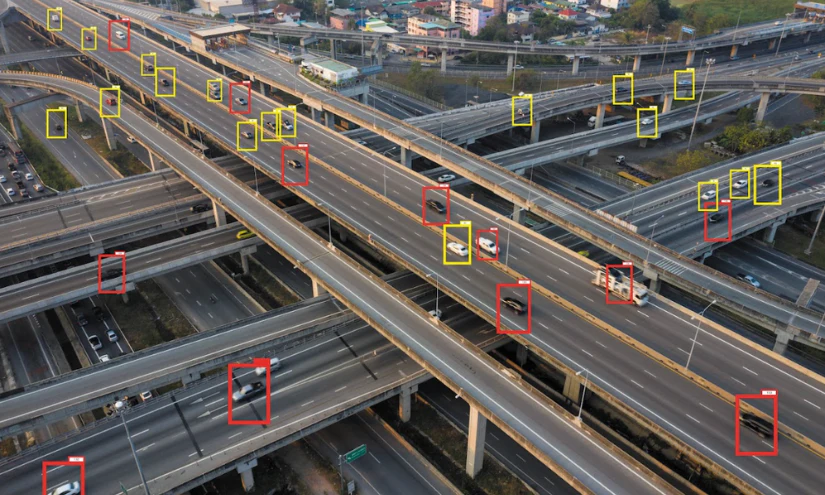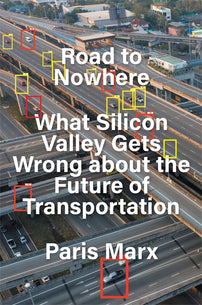Road to Nowhere: a Letter from the Editor
This is what happens when you leave the important questions to Silicon Valley: they re-engineer the past rather than re-imagine the future.

Leo Hollis is the editor of Road to Nowhere: What Silicon Valley Gets Wrong about the Future of Transportation by Paris Marx, on sale 5 July and a selection in our book club. See our other book club selections here.
Let’s start with Elon Musk. He is not the only problem here – as Paris Marx sets out so brilliantly in their new book ROAD TO NOWHERE – but he seems to sum up so much of what is truly incomprehensible when we think about technology, transport and the future of our cities.
On March 15, 2019, Elon Musk unveiled the Tesla Cybertruck to a stupidly excited crowd, offering only digital renders of a prototype, in a Blade Runner style. Late that year Tesla trademarked ‘Cybrtrk’ and Musk promised to share his new miracles on wheels in ‘maybe two or three months’. Yet in November, when a version of this monster was unveiled, a Musk assistant tried to show off the bullet proof glass windscreen, shattering the side window as he hurled a metal ball. In April this year Musk had another go, and stood on stage with a prototype that appeared to be missing door handles, claiming the car will know when the driver is approaching.
Needless to say, the actual car does not exist yet: it is the very definition and symbol of arrested development. It remains a tech bro fantasy of what a truck should look like, filled with features that no one wants, responding to needs that do not exist. It is snake oil in cold rolled stainless steel and leather upholstery. Furthermore, at present, the car is not even likely to be deemed as ‘street-legal’ in Australia or the EU, as it refused to conform to standards for pedestrian and cyclist safety. Yet, this is the richest guy in the world.
This is what happens when you leave the important questions to Silicon Valley: they re-engineer the past rather than re-imagine the future. Paris Marx’s brilliant book on the history and future of the automotive industry shows how every technological step forward has proscribed the narrowing of our social horizons. In addition to his fantasy truck, Elon Musk has come up with genius solutions to the problem of traffic – boring holes under the city; reinventing the train – the hyperloop; and of course, leaving earth behind altogether, at least for the rich.
Marx’s story starts decades before Musk, however. It opens with the birth of the automotive society itself. The invention of the car does not just foreshadow the climate catastrophe or, to borrow Virilio's notion, the first car crash. (Since 1899, in the US alone, 3.7 million people have been killed in car accidents). The very first electric car was designed in the 1890s but was quashed by the interests of big oil. It also heralded the increased hollowing out of our cities, where cars came to symbolise freedom, individualism, and social status. Buses and tram services were driven out of town. In the post war period, freeways and flyovers decimated inner city communities to encourage ownership and the rise of the suburbs.
Today, we are told it is technology, not urban planning, that will save us. And Paris Marx’s book offers us a wide-ranging tour through the ideological hard sell on the futures of Uber and Lyft, autonomous vehicles, drone delivery services, eScooters, tunnels, and what they call ‘the coming fight for the sidewalk’.
Marx is the ideal tour guide. They are the host of the award-winning podcast ‘Tech Won’t Save Us’, which is one of the liveliest and consistently critical series of discussions on the politics of technology. They have also become the left’s leading Muskologist, writing about Elon’s Adventures for NBC News, Jacobin, Tribune and many others. But it is not just Musk in their sights.
As an editor who has been working across urbanism, technology and politics, Road to Nowhere also revealed to me so many stories and insights into the way Mountain View fever dreams come to have devastating impacts closer to home. While one can laugh at Uber’s visions for flying cars, or the chasm between the Boring Company’s hype and hysterically poor delivery, these techno-solutions only reinforce the social divisions within our urban landscape. At times, they are downright dangerous. For example, when a self-driving car crashes, who is liable? The transition to battery powered vehicles has already caused a rush for rare elements, often mined in the Global South, that is destabilising democracies far from where the luxury motor is purring to a halt at the charging station.
And so, in response, Paris also drafts a series of people-based solutions that cannot be ignored. Transport should be a system that can liberate and empower the many, rather than deliver the few in air-conditioned isolation. Many of the answers are so simple, but they demand a revolution in thinking that puts the needs of people first, not the fantasies of tech-bro elites.
[book-strip index="1" style="buy"]